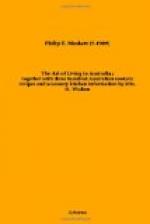But before finally closing this portion it is necessary to say a few words about olives, from which the famous olive oil is obtained, and indeed with regard to their virtues nearly a volume might be written. With many people the olive, like the tomato, is an acquired taste, and unfortunately too many fail to overcome their first impressions; but it is certainly worth acquiring, even if the process takes a long time and requires much perseverance, on account of its highly nutritive value. Children are often very fond of olives, and persistent efforts should be made to induce those who do not like them to overcome their aversion. We speak of “French olives” and “Spanish olives”; the former are gathered young, and are small and hard, while the latter are allowed to remain till a later period of growth, when they become softer and more pulpy. The French olives are more piquant in flavour than the larger kind. They are also better to eat as a fruit, though many prefer the Spanish, and are sometimes employed to clear the palate before drinking wines. The larger or Spanish olives are more adapted for cooking, as in the dish known as beef olives, and also for salads. There must be no misconception as to the name French or Spanish as applied to olives; it does not refer to the country from which they are derived, but simply serves to indicate that they are taken from the tree at a particular time in accordance with the habit observed in the respective countries. The mode of preparing the olives as they reach us is as follows: They have been gathered when green, and soaked first of all in strong lye—that is, water saturated with alkaline salt, obtained by steeping wood ashes in the former. They are next soaked in fresh water to remove the somewhat acrid and bitter taste, and are then bottled in a solution of salt and water. Ordinarily they are presented at table in a dish or other suitable vessel, with a little of the liquid in which they have been preserved. In conclusion it may be added that olives form an historical dish, for we are told that the supper of Milton the poet consisted usually of bread and butter and olives.
TEA
Tea, with which we are all so familiar, is in reality a number of dried rolled leaves of the tea plant, Camellia Thea, cultivated chiefly in China and the contiguous countries. It is used excessively throughout Australasia—for has it not been shown that our four million people use more of this beverage than the millions who inhabit Continental Europe, if Russia be excepted? This fact is much to be deplored, for when taken in excess it causes severe functional derangement of the digestive organs, and prejudicially affects the nervous system. The gentler sex are greatly given to extravagant tea-drinking, exceeding all bounds of moderation in this respect. Many of them, moreover, live absolutely on nothing else but tea and bread and butter. What wonder,




